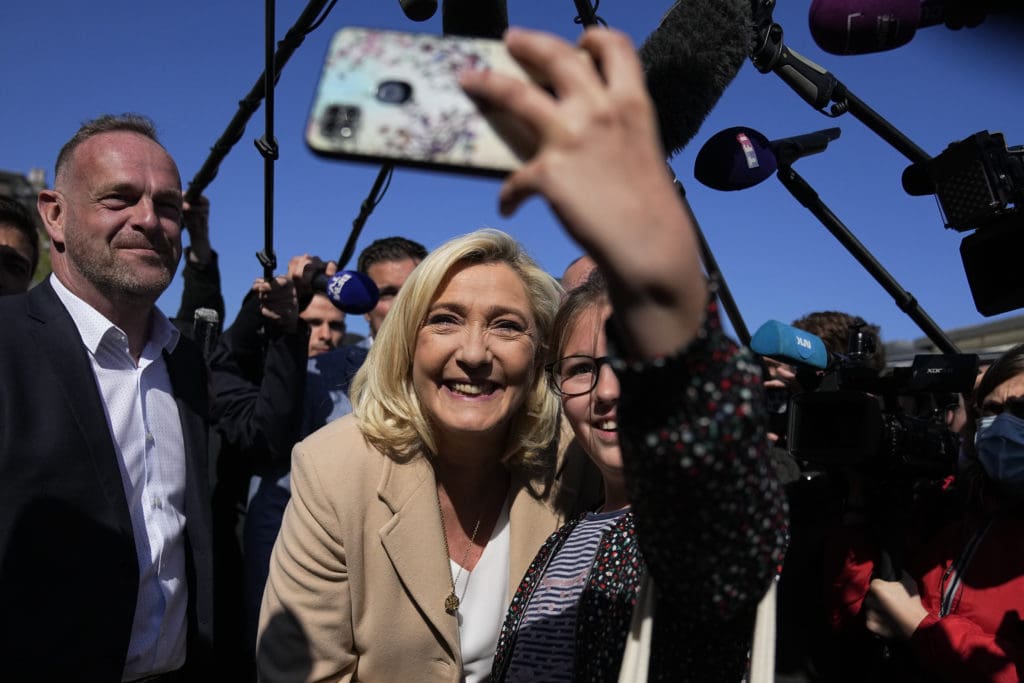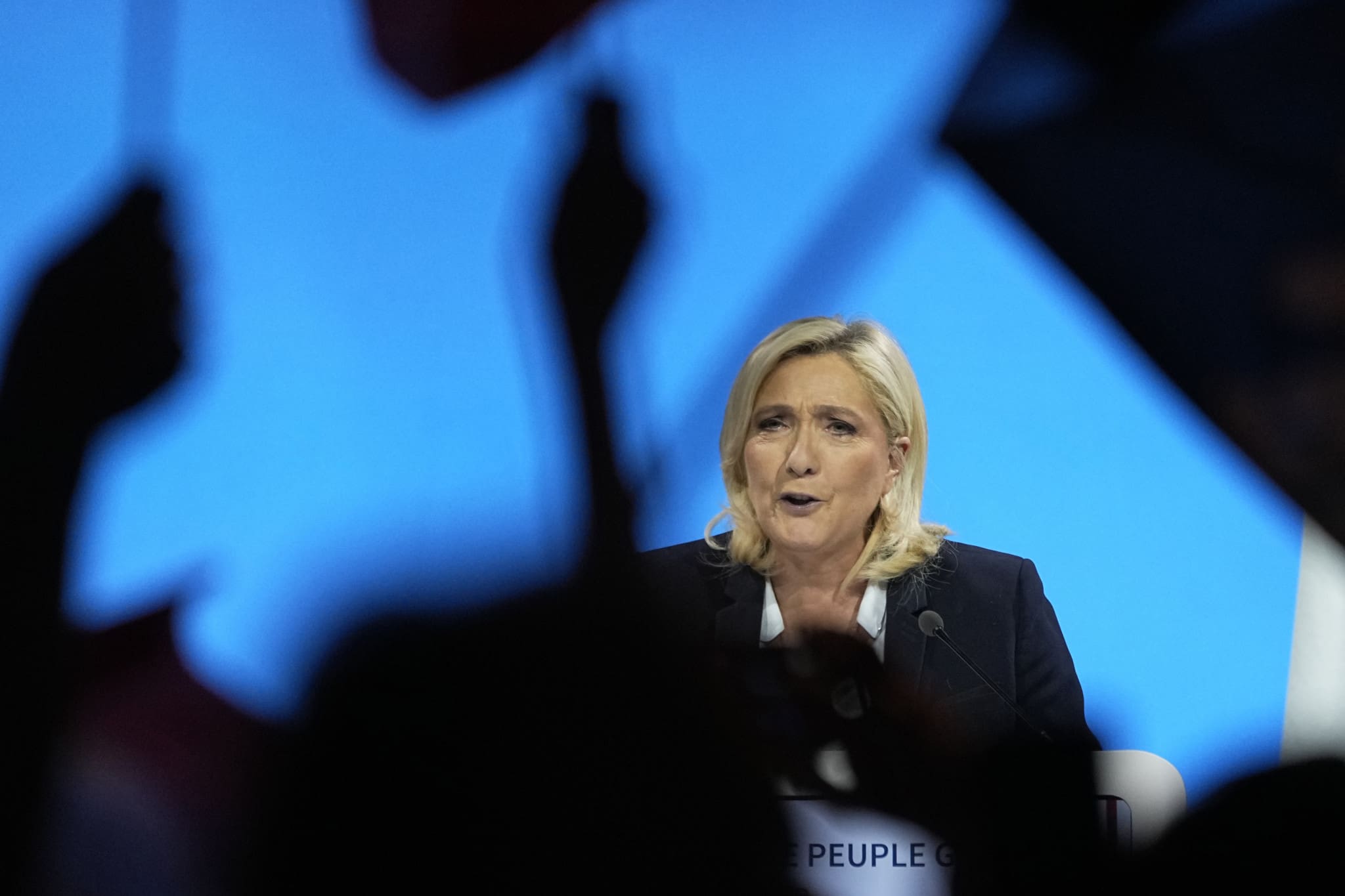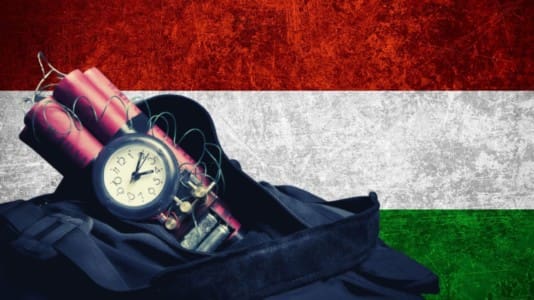Until April 10, the French private and public media focused their attacks on Éric Zemmour, who was considered more right-wing, and had a more liberal-conservative program. When faced with Zemmour, the more economically social and less conservative Marine Le Pen was presented as relatively moderate.
The agenda to keep her party from being demonized embarked upon by Jean-Marie Le Pen’s daughter when she took over the leadership of the National Front (FN) in 2011 thus seemed to have finally reached its goal, four years after her party changed its name to Rassemblement national (RN), or National Rally.
But everything has changed since Monday, April 11. As soon as the results of the first round were published, and now that it is known that the incumbent president Emmanuel Macron will have to face Marine Le Pen in a re-run of the 2017 presidential second-round, the RN candidate is again presented as “far-right,” “anti-republican,” and a threat to democracy and civil peace.
[pp id=34505]
And so, the French establishment is once again almost collectively against Le Pen. Former presidents, whether it be left-wing François Hollande or theoretically right-wing Nicolas Sarkozy, are calling on the French people to vote for the ultra-progressive Emmanuel Macron, the president who will have accelerated mass immigration the most with more than 400,000 new arrivals per year if we take into account the illegal immigrants whose numbers have increased greatly in recent years due to the French government’s leniency.
Macron is also the president who extended access to in vitro fertilization to lesbian couples, and who is now promising to legalize euthanasia if he is re-elected. He is also the president who imposed the apartheid-style vaccination pass and declared that French people who refuse to be vaccinated against Covid-19 should not be considered full citizens, even though the vaccine was officially not compulsory. He is the president who will have let Salafist mosques, who have openly preached a radical Islam incompatible with the French Republic’s laws and basic principles, operate while having non-violent associations, such as Génération identitaire, banned.

But it is still Marine Le Pen, who opposes the legalization of euthanasia, the vaccine pass, and social engineering through mass immigration while promising to close the Salafist mosques and defend the freedoms and security of honest citizens, who is now, once again, presented as an extremist and a danger for democracy.
A well-prepared Le Pen fared much better during Wednesday’s presidential debate with Emmanuel Macron than back in 2017, but probably not good enough to make a difference with Emmanuel Macron still remaining a few points ahead in the polls just days before Sunday’s second-round.
While she has, according to polling, the support of nearly half the French electorate, the French media does not reflect this nearly split opinion. Fearing a possible victory of the “populist” right in their country, the political, intellectual, artistic and media elites have brought out all the heavy artillery in an attempt to sway public opinion.
“With Marine Le Pen, the poor may die,” cried Interior Minister Gérald Darmanin on April 12, in a city where Marine Le Pen obtained more than 30 percent of the vote in the first round.
[pp id=33487]
A victory for Marine Le Pen would endanger the lives of feminist, Antifa, and anti-racist activists, according to journalist and LGBT activist Alice Coffin, a councilor for the Greens in the Paris city council, who was interviewed by the daily newspaper Libération.
“What risks do feminist activists face if Marine Le Pen wins the presidential election?” her interviewer asked, to which Coffin replied: “It’s simple, it would mean the death of feminist activists in a very concrete way. In the literal sense. If the far-right wins, I, like so many other feminist, Antifa, or anti-racist activists, are threatened with death. Voters should keep this in mind on April 24.”
Moreover, Coffin explained “the National Rally reduces to nothing any possibility of emancipation for women,” and “the Hungarian and Polish experiences must serve as a lesson: in case of victory of the far-right, there will be danger all around and it will concern not only women in France but in all Europe because the barriers will fall in the European Parliament, there will be a contamination effect.”
Meanwhile, an interview with Central Consistory of France chairman Elie Korchia, published with the Le Monde newspaper on, April 17, was entitled: “Jews in France could be forbidden to continue eating kosher” should Marine Le Pen be victorious on Sunday.
[pp id=34601]
“We have no right to mortgage our children’s future by remaining passive witnesses to an impending political catastrophe. Let’s vote Emmanuel Macron,” called the rector of the Grand Mosque of Paris on April 15. Such a call may surely appeal to some of the voters of Jean-Luc Mélanchon, the Islamo-leftist candidate who came third in the first round with just 400,000 fewer votes than Marine Le Pen, but first among Muslim voters, with more than 60 percent of the votes in some cities inhabited by a large majority of Muslims.
The public radio station, France Info, explained on April 19 that “behind her speech that makes her sound more banal, the [RN] candidate defends a xenophobic and authoritarian program, which would weaken the checks and balances and would have France ostracized by European democracies. ”
“Marine Le Pen and the threat of an institutional coup de force,” was the headline in Challenges magazine on April 16, warning of the risk of “a sort of coup d’état” with the RN candidate’s proposed referendum on immigration, while the columnist of Alternatives économiques spoke on April 13 of a “permanent coup d’état” with Marine Le Pen who, according to him, would be “the heiress, whatever she says, of the National Front, the party at the root of the National Rally, which was a refuge for nostalgics of Vichy, or even of Nazism.”
[pp id=34209]
“If Marine Le Pen were elected, she could become the commander-in-chief of the French [nuclear] strike force, and unleash the equivalent of 48,000 Hiroshimas on a large part of the United States, Russia, China, Africa – and on Europe,” warned L’Obs’s doom-mongering columnist on April 13.
On its April 21 front page, another important weekly, Marianne, called for voting in favor of Emmanuel Macron with the cover headline: “Despite the anger… avoid chaos.”
The president of the University of Nantes violated French law and her duty of neutrality by using her position to write to more than 37,000 students and 4,000 university staff members, calling on them to “stop the extreme right and therefore the National Rally” in the second round of the presidential election on April 24. Similarly, on April 12, the association bringing together representatives of 116 higher education and research institutions, France Universités, called for “fighting the extremism carried by Marine Le Pen’s candidacy and voting for Emmanuel Macron.”
On April 15, the French media announced that 500 artists had published an open letter calling for a vote for Emmanuel Macron against Marine Le Pen’s program of “xenophobia and insularity.”
“Today, what used to be called the Republican front [the French cordon sanitaire against Le Pen and her party] is cracking. We are dismayed by this,” lamented the artists. “Tomorrow, we dare not imagine what would become of culture in our country if she were the one designated by the vote,” the letter read.
It is ironic that the OSCE observer mission set up at the request of the Hungarian opposition, and a group of MEPs to monitor the April 3 elections in Hungary noted in its report “extensive bias in a number of broadcast and online media against United for Hungary and in favor of the government and Fidesz,” complaining that “this has deprived voters from receiving accurate and impartial information about the main contestants, thus limiting their opportunity to make an informed choice,” with “coverage” that “was often intertwined with comments by journalists and personal attacks on the opposition leader, Mr. Márki-Zay.”
As a matter of fact, what Márki-Zay and the United for Hungary opposition coalition had to endure was nothing compared to the way Marine Le Pen and her National Rally have been, and continue to be treated during the French elections.






